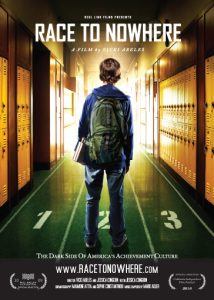Race to Nowhere VS Amy Chua
After watching “The Three Idiots” last week, I thought it would be interesting to find a movie on education in the United States. Though not about the American higher education system, “Race to Nowhere” painted a picture of the American education system that shared many surprising similarities with many of the characteristics or even stereotypes of the Asian education systems.
“Race to Nowhere” is a 2009 documentary film by Maimone Attia and directed by Vicki Abeles and Jessica Congdon. The film is partially based on the personal story of co-director Vicki Abeles, as the pressure of school, tutoring and extracurricular activities were making her middle school daughter sick. However, the film aims to challenge the public to think about the amount of pressure that parents are putting on children to push them to succeed. The film featured the stress young children experience with over-scheduling, over-testing and getting into the top colleges in the country. The film coined such unhealthy pressure and competition among students as a “silent epidemic” and advocated for a reform of the education reform in the US. “Race to Nowhere” was shown nationwide and internationally in more than 7,000 schools, and became a center grass-root movement for education reform.
You can watch the entire movie on Netflix.
On the other hand, I was immediately reminded of another prominent yet controversial voice, Tiger Mom-Amy Chua, a professor at Yale Law School. Amy Chua is the author of the book, Battle Hymn of the Tiger Mother, a New York Times Bestseller memoir that revealed the strict “Chinese” way that she raised her two children. The ways that Amy Chua talked extensively and proudly about in her memoir almost completely contradicted of the purpose of the movie “Race to Nowhere”. Ironically, the amount of stress that Amy Chua put on her children resulted in what was considered “success” by the parents in the movie, as both of Amy Chua’s daughters attended Ivy League schools and received enormous recognition of their music talents.
As we discuss higher education today, the conversations are not limited to curriculum and policies after students enrolled in higher education institutions, but also included what happened prior in order to get the students where they are today. Attending top universities, getting scholarships and obtaining resources are issues of accessibility and affordability.
You can find Amy Chua’s website here: http://amychua.com/the-book/
I would love to hear about your thoughts!


Thank you Joanna,
I loved Race to nowhere when I first watched it. Very helpful to understand some of the downsides of the US society.
I strongly encourage each of you to watch it, especially when you face criticisms around the stress in China, japan and Korea about the national entrance examination to college. The documentary shows that this not exclusively an East-Asia issue.
I remember when I read a newspaper article about Amy Chua for the first time. I was a highschooler and I totally abhorred her interview when she said she even didn’t give a bathroom break when her daughter was in piano(or violin) practice. I have experienced this “Chinese” or “Asian” (since Korean parents also have similar stance) education and as a young child, I suffered from tremendous stress. And still after entering a privileged college, I questioned whether that was my success and what was happiness from it since after I have suffered so much for that.